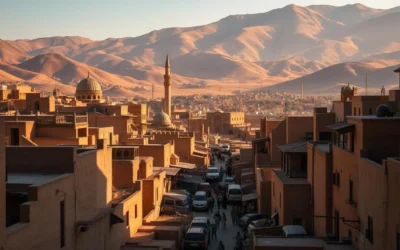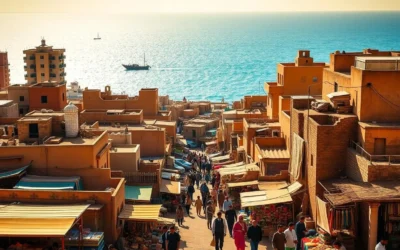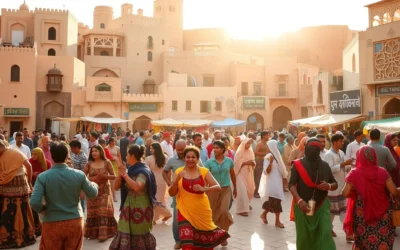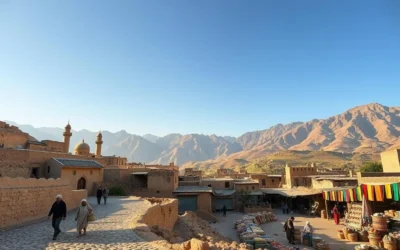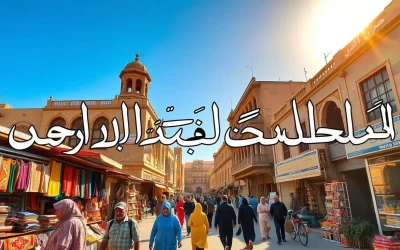✓ Accommodations ✓ Flights ✓ Rental Cars
Nestled at an altitude of 7,500 feet, one of the world’s oldest continuously inhabited cities awaits your discovery. With a rich history dating back to the 6th century BC, this ancient city is a treasure trove of cultural and architectural marvels.
As you explore the narrow alleyways of the Old City, you’ll be struck by the unique blend of ancient Arabian charm and modern developments. The city’s distinctive architectural style, characterized by tall tower houses with intricate geometric patterns and stained-glass windows, has remained largely unchanged for centuries.
Despite the current challenges, the enduring beauty and cultural significance of this ancient capital continue to captivate visitors. As you plan your trip, you’ll want to experience the top attractions, from magnificent mosques to vibrant markets, that make this city a must-visit destination.
Discovering Sanaa: Yemen’s Ancient Capital
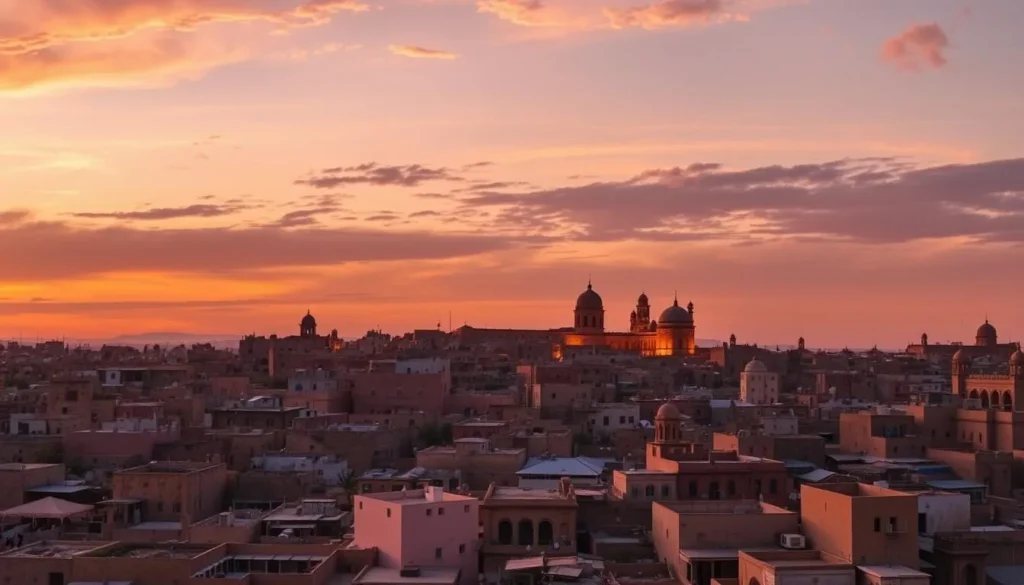
As Yemen’s ancient capital, Sanaa is a treasure trove of historical significance, cultural depth, and architectural marvels. You can explore the historical significance of Sanaa, with roots tracing back to the 6th century BC, making it one of the oldest continuously inhabited city in the world.
The old city of Sanaa, a UNESCO World Heritage site, boasts a rich history that spans thousands of years, offering a unique glimpse into the past. Its designation as a world heritage site underscores its cultural and historical significance on a global scale.
Sanaa’s location at 7,500 feet elevation has significantly influenced its development, preserving its unique character throughout the centuries. This ancient capital has maintained its traditional character while adapting to modern influences, creating a fascinating blend of old and new.
Throughout Yemen’s history, Sanaa has played a strategic role as the cultural and political heart of the country. You can appreciate the city’s importance and its enduring legacy as you explore its ancient streets and historical landmarks.
Experience the Magic of Sanaa’s Old City

As you step into Sanaa’s Old City, a UNESCO World Heritage Site, you’ll be transported to a world of ancient charm and character. The Sana’a Old City is famous for its tall houses with intricate patterns and stained-glass windows.
Traditional Architecture and Design
The traditional Yemeni architecture in Sanaa’s Old City is a marvel, featuring tower houses that rise 5-9 stories high. These houses are adorned with intricate geometric patterns, white gypsum decorations, and colorful stained-glass windows, showcasing the skill and care of Yemeni builders and artisans.
Ancient Alleyways and Streets
Walking through the Sana’a Old City’s narrow, winding streets is a unique experience. These paths, made for camels, make the city feel like a maze, inviting exploration and discovery.
Historic Houses and Buildings
The historic houses and buildings in Sanaa’s Old City showcase the remarkable craftsmanship of Yemeni artisans. Many of these structures date back hundreds of years and still function as family homes, providing a glimpse into the authentic way of life that continues in the Old City.
Key Experiences:
- Immerse yourself in the enchanting atmosphere of Sanaa’s Old City.
- Marvel at the traditional Yemeni architecture.
- Wander through the ancient alleyways and streets.
- Explore the historic houses and buildings.
- Experience the authentic way of life.
Explore the Great Mosque of Sanaa
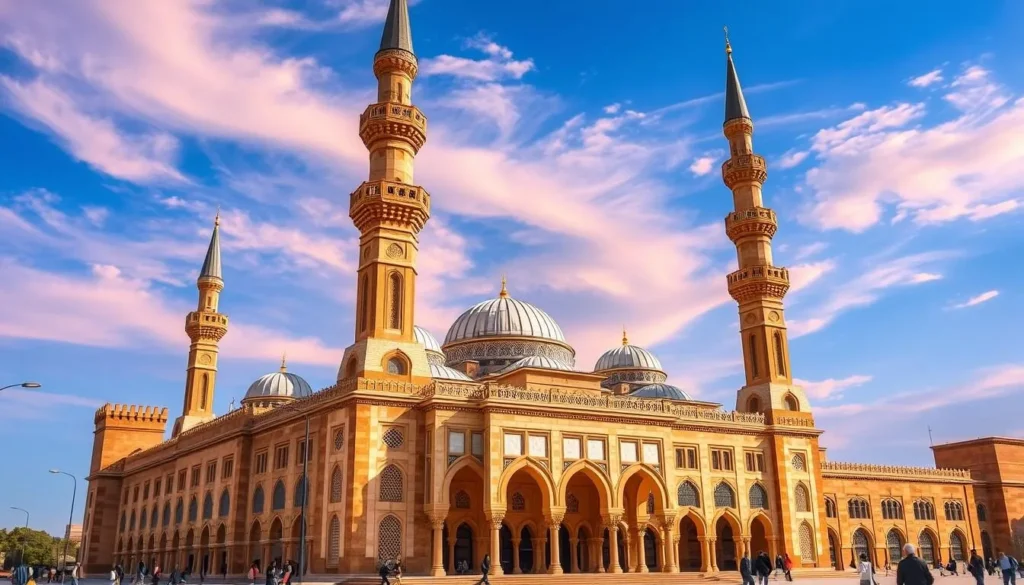
As you explore Sana’a’s Old City, you’ll discover the Great Mosque of Sanaa, a revered site with deep historical roots. The Great Mosque, also known as Jami’ al-Kabir, is one of the oldest mosques in the Islamic world, with its foundations dating back to the time of Prophet Muhammad.
Architecture and Historical Significance
The Great Mosque of Sanaa exemplifies classic Islamic architecture, featuring distinctive minarets and ornate interior decorations. Its historical significance is profound, representing a crucial part of Yemen’s Islamic heritage and cultural identity.
Viewing Tips for Non-Muslims
Although non-Muslims cannot enter the mosque, its beauty can be admired from nearby rooftop terraces. You can experience the atmospheric call to prayer resonating from the mosque throughout the Old City, creating a memorable auditory dimension to your visit.
Visit the Magnificent Al Saleh Mosque
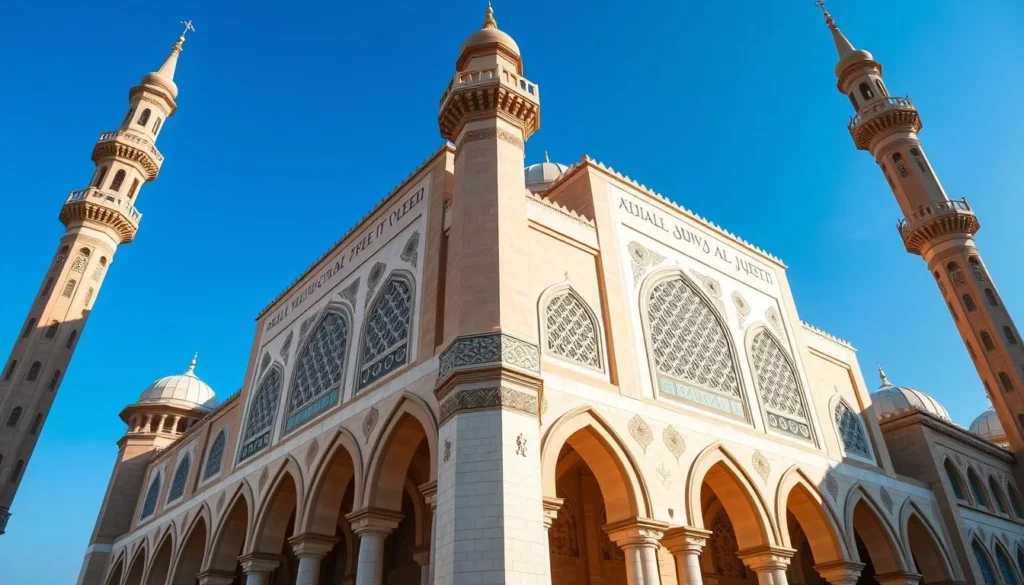
Sana’a’s Al Saleh Mosque is a testament to the blend of traditional Yemeni design and modern Islamic architecture. Finished in 2008, it covers an impressive 294,000 square feet and can accommodate over 40,000 worshippers, making it one of the largest mosques in the region.
Interior Design and Features
The interior of the Al Saleh Mosque is breathtaking, featuring various Yemeni stones such as black basalt and colorful limestone. The mosque boasts five beautifully decorated domes and intricate wooden roofs, creating a serene atmosphere. The blend of materials and designs honors Yemen’s architectural heritage.
Best Times to Visit
To experience the mosque’s peaceful ambiance, visit during the early morning or late afternoon when natural light filters through its windows and domes. This timing enhances the spiritual atmosphere, making your visit even more memorable.
Discover Bab Al-Yemen: The Ancient Gateway
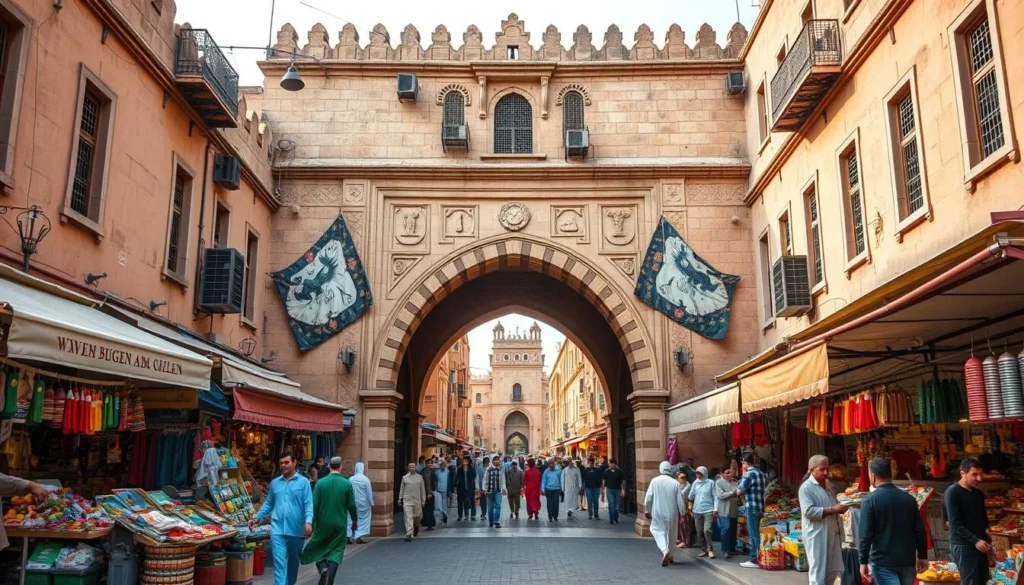
Bab Al-Yemen stands as the majestic entrance to Sanaa’s ancient heart, embodying the city’s rich cultural heritage. This iconic gateway is more than just a historical landmark; it’s a lively marketplace that encapsulates the essence of Sanaa.
The Historic Gate and Its Significance
The Bab Al-Yemen gate has been welcoming travelers into Sanaa for centuries, serving as a symbol of the city’s rich history. Its significance extends beyond its role as a physical entrance, representing a threshold between the old and new parts of the city.
The Vibrant Market Scene
As you pass through Bab Al-Yemen, you’re surrounded by a bustling market scene. Vendors on both sides sell a variety of local goods, including spices, coffee, handicrafts, and fabrics, making it a vibrant hub of activity in the Old City.
Key experiences at Bab Al-Yemen include exploring the gate’s historical significance, immersing in the vibrant market scene, and appreciating the detailed architecture of this ancient gateway.
Shop in Traditional Souqs and Markets
As you explore Sana’a, you’ll be surrounded by the vibrant atmosphere of the Old City Market. Immerse yourself in the local culture and discover unique souvenirs, including intricately embroidered textiles and silver jewelry.
Old City Market Experience
Experience the sights and sounds of the market, where you can find a wide range of traditional handicrafts.
Local Handicrafts and Souvenirs
Discover the rich cultural heritage of Yemen through its traditional handicrafts.
Visit the Stone Castle (Dar Al-Hajar)
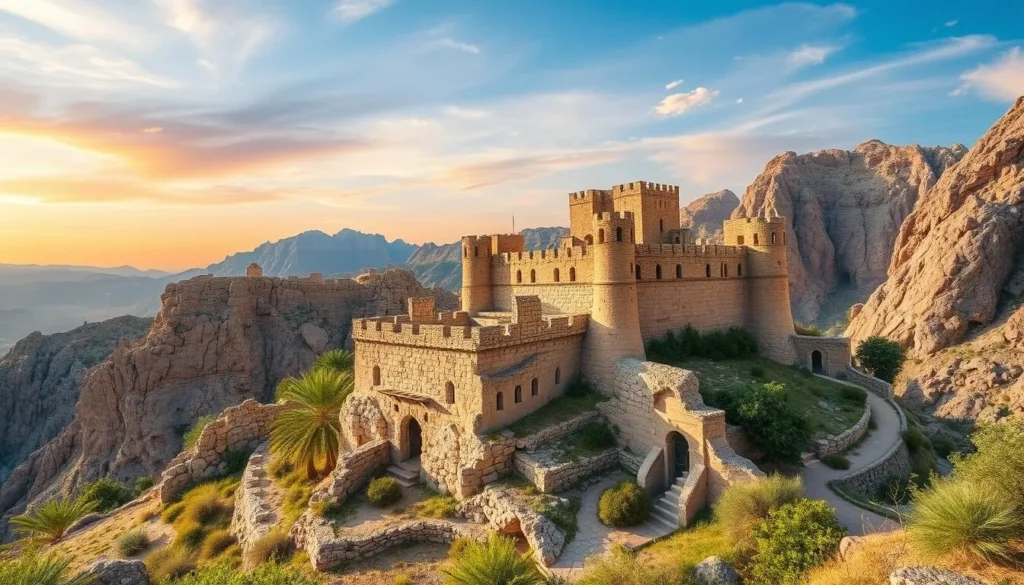
Perched atop a rocky hill north of Sanaa, the Dar Al-Hajar, or Stone Castle, is a must-visit attraction in Yemen. This iconic landmark is known for its unique architecture and historical significance.
Architecture and History
The Dar Al-Hajar was built for Imam Yahya in the 1930s and served as a royal residence until his death in 1948. The castle exemplifies traditional Yemeni building techniques, with its multiple stories rising organically from the rock foundation. As a significant architectural landmark, it now functions as a museum, offering insights into the country’s rich history and royal life.
Panoramic Views and Photo Opportunities
From the upper levels of the Stone Castle, visitors can enjoy panoramic views of the surrounding countryside. This makes the Dar Al-Hajar a favorite spot for both tourists and local wedding photographers. The views from this historic place in the country are truly breathtaking, making it a memorable experience.
Explore Mountain Towns of Kaukaban and Shibam
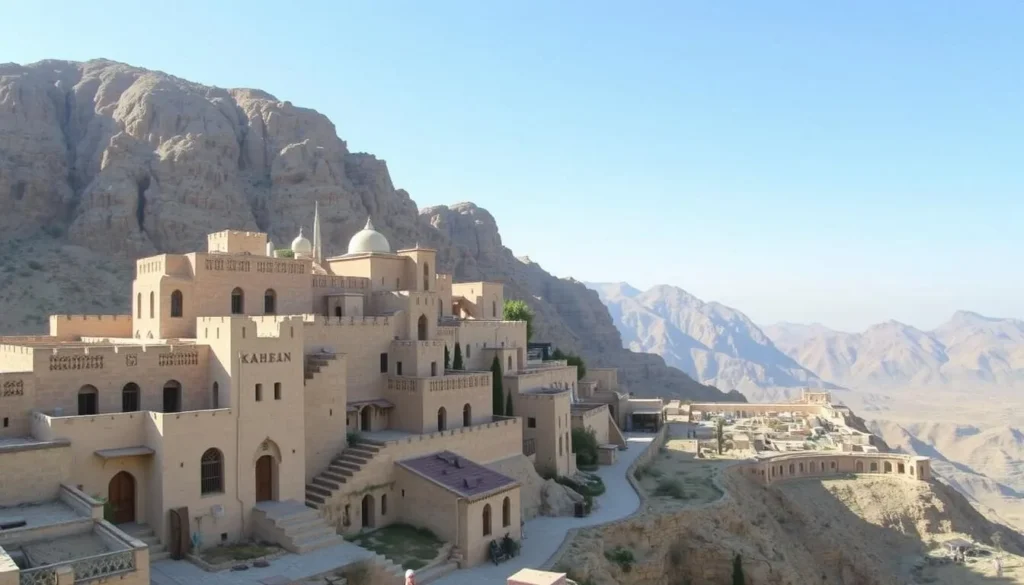
Escape to the serene mountain towns of Kaukaban and Shibam, nestled in Yemen’s breathtaking landscapes. These towns offer a peaceful escape from Sana’a, just an hour’s drive away.
Scenic Mountain Views
From Kaukaban’s mountain top, enjoy panoramic views of the surrounding valleys and Sana’a in the distance. The dramatic landscapes with rugged peaks are truly breathtaking.
Historical Architecture
Explore the historical architecture of Kaukaban and Shibam, featuring ancient fortresses, mosques, and traditional multi-story houses that showcase Yemen’s rich heritage.
Local Culture
Immerse yourself in the local culture of these mountain communities, where traditional ways of life continue. Experience authentic Yemeni hospitality and understand the resilience of the Yemeni people in the face of conflict.
Experience Authentic Yemeni Coffee Culture
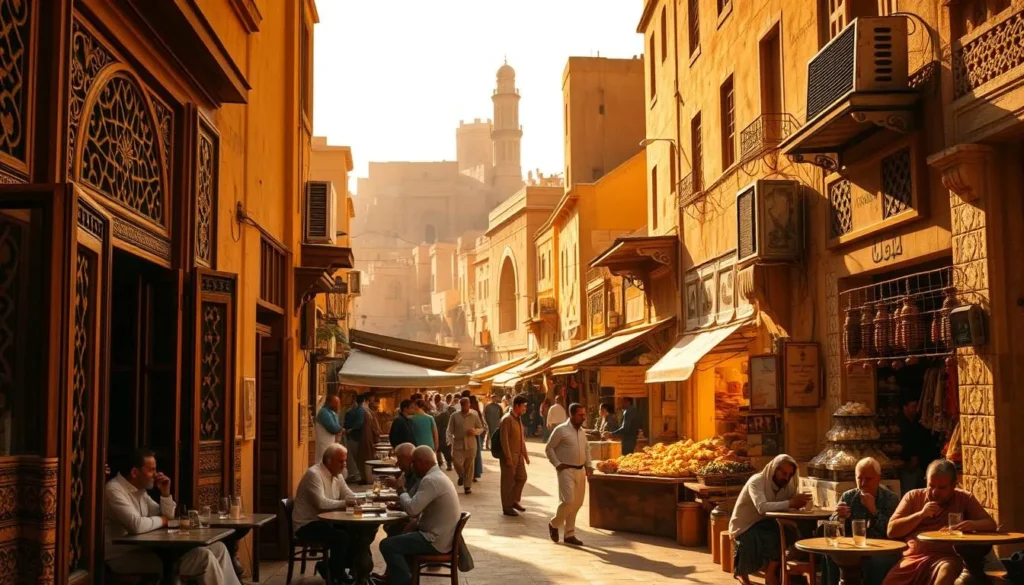
The city of Sanaa is a haven for coffee lovers, offering a unique glimpse into traditional Yemeni coffee culture. As you explore the ancient city, you’ll discover that Yemeni coffee is more than just a beverage; it’s an integral part of the local heritage.
Traditional Coffee Houses
In Sanaa’s Old City, traditional coffee houses are a staple of the community. You’ll find cozy cafes tucked away in narrow alleys, where locals gather to socialize and enjoy a cup of Yemeni coffee. These traditional coffee houses offer a genuine experience of the local culture.
Coffee Preparation and Tasting
The preparation of Yemeni coffee is an art form that has been passed down through generations. You’ll have the opportunity to witness the traditional brewing methods and taste the distinct flavors of coffee that are characteristic of traditional Yemeni coffee. Savor the rich aroma and flavor profiles that reflect the country’s diverse growing regions.
Discover Historic Amran
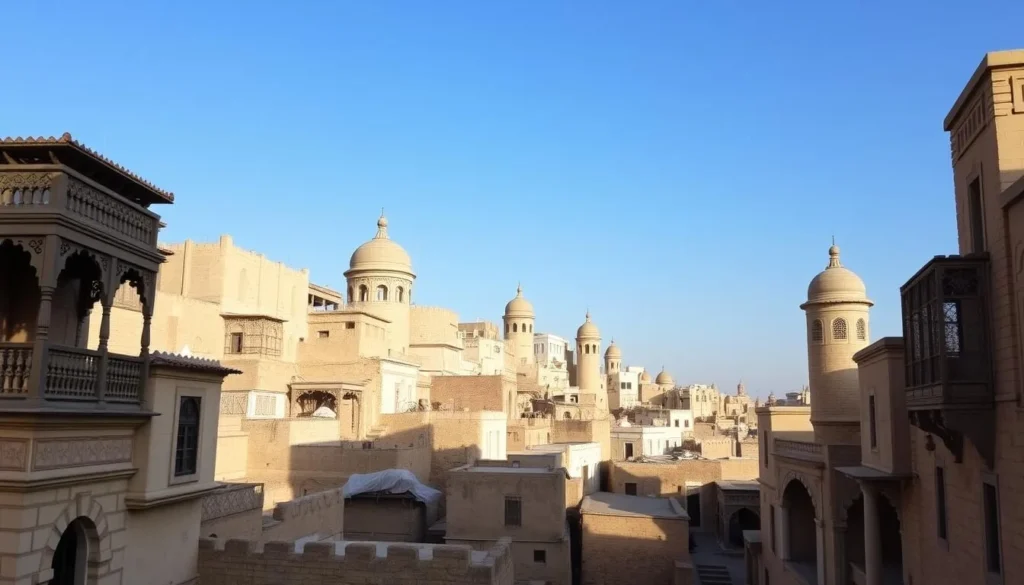
Located near Sanaa, Amran is a hidden gem that showcases Yemen’s rich architectural heritage. You can explore the well-preserved historic city, wander through ancient streets and alleys, and discover historic mosques and public buildings.
The city’s traditional Yemeni structures and peaceful atmosphere make it an ideal destination for those seeking to experience authentic Yemeni culture.
- Explore Amran’s historic city, largely untouched by war damage.
- Admire traditional Yemeni craftsmanship in ancient structures.
- Experience the local community’s daily activities.
Sanaa, Yemen: Best Things to Do – Top Picks
When visiting Sanaa, Yemen, you’ll discover a city that’s a treasure trove of history, culture, and breathtaking beauty. As the capital and largest city, Sanaa is perfect for exploring UNESCO World Heritage sites and experiencing the rich cultural heritage of Yemen.
UNESCO World Heritage Highlights
The Old City of Sanaa is a world heritage site that boasts some of the most impressive architectural wonders in the region. You can explore the ancient alleyways, historic houses, and magnificent mosques that make Sanaa a unique cultural destination. Some of the top attractions include the Great Mosque of Sanaa and Al Saleh Mosque, showcasing the city’s rich history and cultural significance.
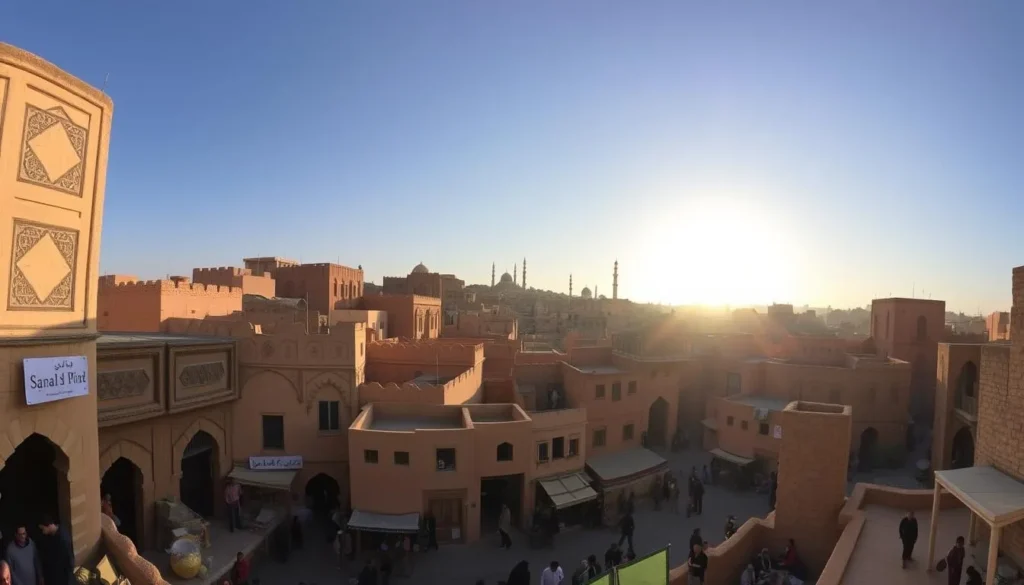
Cultural Experiences Not to Miss
Sanaa offers a range of cultural experiences that allow you to engage with local traditions and customs. You can visit traditional souqs and markets, where you can witness artisanal crafts being made and participate in authentic Yemeni customs. Some of the top cultural experiences include shopping for traditional Jambiyah daggers, sipping on traditional Yemeni coffee, and exploring the vibrant market scene at Bab Al-Yemen. By immersing yourself in these experiences, you’ll gain a deeper understanding of the city’s rich cultural heritage and create lifelong memories of your visit to this incredible city.
- Explore the ancient alleyways and historic houses of the Old City
- Visit the magnificent mosques, such as the Great Mosque of Sanaa and Al Saleh Mosque
- Shop for traditional Jambiyah daggers and other local handicrafts
- Experience the vibrant market scene at Bab Al-Yemen
Immerse in Local Traditions and Culture
As you wander through the ancient streets of Sanaa, you’ll be enveloped in a rich cultural heritage. The city’s traditional attire and vibrant markets will give you a deep understanding of Yemeni culture.
Traditional Dress and Customs
Yemeni attire is a testament to the country’s identity. Men wear turbans, while women wear burqas.
Local Hospitality
Yemenis are known for their warm hospitality, often inviting visitors to share meals or tea.
Cultural Experiences
Experience local customs through khat chewing sessions and other cultural events.
Best Time to Visit Sanaa
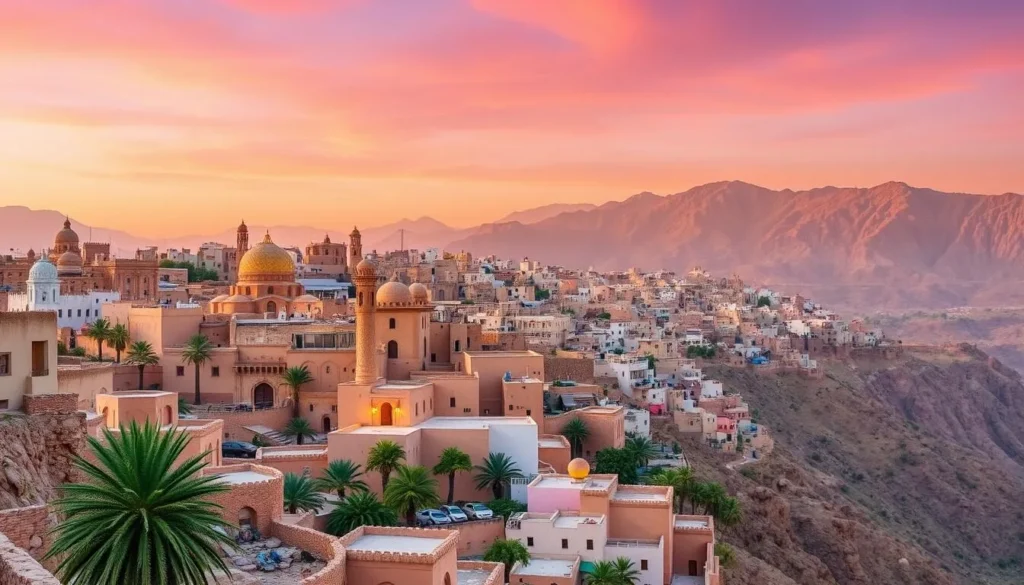
To make the most of your trip to Sanaa, understanding the seasonal variations is key. The city experiences mild summers (June-September) with temperatures averaging 70-80°F (21-27°C) and cool winters (November-February) around 50-65°F (10-18°C).
Spring (March-May) and autumn (October-November) are considered the best times to visit, offering pleasant temperatures and clear skies ideal for sightseeing. Be aware of religious observances like Ramadan and the rainy season (July-August), which can impact your travel experience.
Where to Stay in Sanaa
Accommodation in Sanaa varies, reflecting the city’s rich history and cultural heritage. You can choose from a range of hotels that cater to different budgets and preferences.
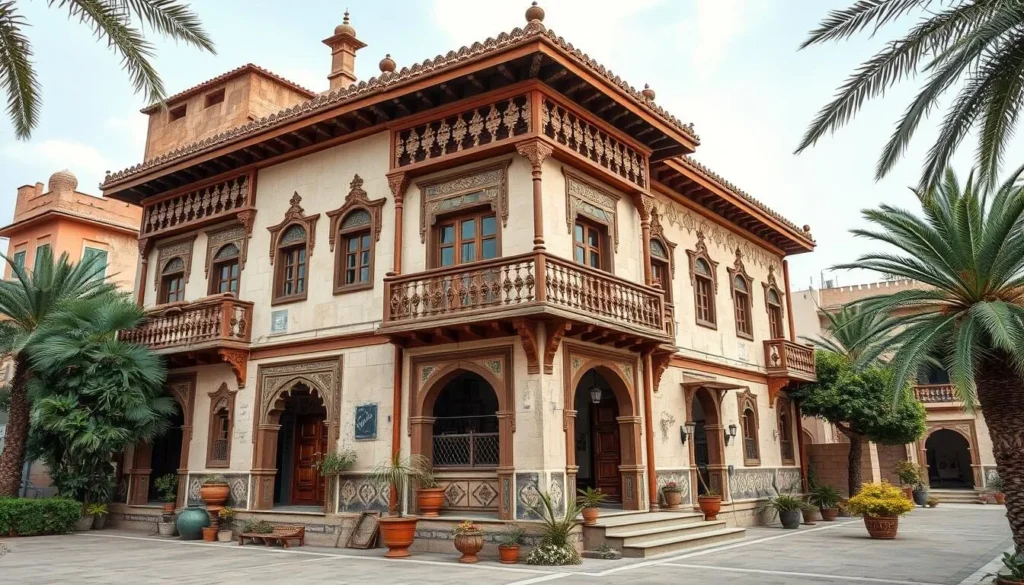
Old City Accommodations
Historically, the Old City offered unique stays in centuries-old tower houses converted into boutique hotels. However, many of these are currently closed due to the ongoing situation.
For an authentic experience, consider staying in the Old City if options become available.
New City Hotels
The New City has a range of hotels, including international chains and local establishments, offering modern amenities and higher security.
Sana’a’s 5-star Sheraton Hotel is an example, though it’s on the pricier side.
Getting Around Sanaa
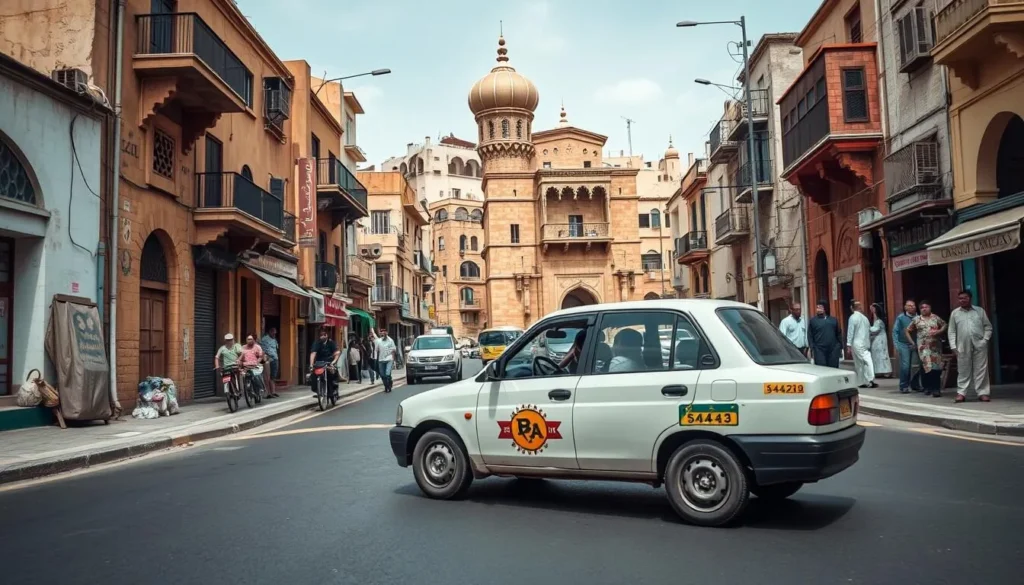
Getting around Sanaa involves choosing from a range of transportation methods, each with its own advantages. You can navigate the city using taxis, shared taxis known as “dababs,” or private car hires arranged through your hotel.
Walking is the best way to explore the Old City of Sanaa, as its narrow alleyways and pedestrian streets were designed for foot traffic and camels rather than modern vehicles.
When using taxis, it’s practical to negotiate fares in advance, as meters are rarely used. Consider hiring a driver for the day if you plan to visit attractions outside the city center.
Be aware of potential security checkpoints when moving between different areas of the city and know how to navigate them smoothly.
Hiring a local guide can enhance your experience, providing not only transportation logistics but also cultural context and deeper understanding of the sites you visit.
Safety Tips for Visiting Sanaa

To stay safe in Sanaa, it’s crucial to understand the local security context. The city is affected by the ongoing conflict, which can impact your travel plans.
Here are some essential safety tips:
- Understand the current security situation and how it might affect your visit.
- Be aware of your area and avoid military checkpoints and government buildings.
- Stay informed and connect with locals to get up-to-date information about safe areas.
By being informed and cautious, you can minimize risks and have a safer experience in Sanaa.
Conclusion
Visiting Sanaa, Yemen, is a journey through time. As you explore the ancient city, you’ll discover vibrant markets like Bab Al-Yemen and majestic structures like the Great Mosque. To truly experience Sanaa, respect local customs and contribute to the community. By doing so, you’ll enrich your journey and help preserve this cultural treasure.
—
The above is subject to change.
Check back often to TRAVEL.COM for the latest travel tips and deals.

